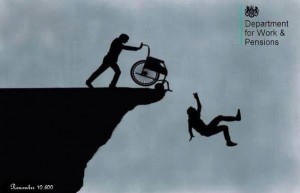When the government announced earlier this month that the work capability assessment was to be abolished, it might have expected there to be general rejoicing that a hated assessment system was coming to an end. Instead, the news has provoked widespread dismay.
It has even led the campaigning group, The Spartacus Network, to reform and begin work on a new report, according to the Disability News Service.
So what is it people are so concerned about?
What is replacing the WCA?
In essence, instead of an assessment that decides if you have limited capability for work or work-related activity, the DWP will only look at whether you have an award of any element of PIP. If you do, you will get an additional health element paid in your UC.
However, even if you get the health element, that will not make any difference to whether you have to carry out mandatory work-related activities. Instead, that decision will be made by a work coach. They will create a package of activities based on what they think you are capable of doing, some of which may be compulsory and some of which may be voluntary.
No-one automatically incapable of work
So, one of the biggest concerns is that no-one will be automatically protected from having to do work-related activities, including people who were previously in the support group of ESA or the UC LCWRA group and who are transferred onto UC.
So, the whole idea of some claimants being automatically protected from work-related activities will be swept way.
632,000 people in support group or LCWRA group don’t get PIP
According to the DWP’s own figures, there are 632,000 claimant who are in the support group or LCWRA group of UC but who do not get PIP or DLA. These are people who are currently judged to not be able to undertake any work-related activities but who would not get the proposed UC health element and would be obliged to look for work and bear the full brunt of an enhanced sanctions regime.
Decisions about capability made by non-medically qualified staff
Decisions about what work-related activities you can do and whether they will be voluntary or mandatory will be made by medically unqualified work coaches who may be under pressure to meet targets for job starts and sanctions.
Private sector assessors may be bad, but at least they have some medical training. Work coaches will only have the training the DWP give them.
No appeal against work coach decisions
Many more people will run the risk of being sanctioned under the UC health element proposals, because they may be subject to mandatory work-related activities. At present, you can appeal if a WCA decision is that you are capable of work-related activities. Under the new system that decision will be made by a medically unqualified work coach and you will not have the same appeal rights.
No substantial risk rule
Many people currently get UC LCWRA because it is decided that there would be a substantial risk if they were found to be able to do work-related activities. Under the new system this exemption doesn’t appear to exist, meaning that people currently protected by this rule will potentially be subject to a more severe sanctions regime.
Shorter-term conditions not covered
The qualifying conditions for PIP mean that you need to have had your difficulties with everyday activities or mobility for three months and they must be expected to last at least another nine months unless you are claiming on the grounds of terminal illness). This means that people with short-term but extremely severe illnesses will not be eligible for the UC health element. According to the Institute for Fiscal Studies up to 1 million people who have short-term or fluctuating conditions could lose £350 a month as result of abolishing the WCA.
New arrivals will not be eligible
Many people who have recently arrived in the UK will not be eligible for the UC health element’ even though they may be eligible for UC itself. This is because the PIP residence and presence rules are more demanding than the habitual residence test for UC.
Trying work may seem even more risky
The white paper says that one of the main reasons for making this change is that people will no longer have to worry that if they attempt work they will lose their UC.
But, in reality, people also worry that if they attempt work they may lose their PIP.
Claimants know that that huge assumptions are made about their abilities on the flimsiest of evidence. Being able to drive a car, use public transport, keep appointments, talk to people and so on can all be used by assessors as evidence that you can carry out many PIP daily living and mobility activities.
So, by linking your PIP award to the new health element of UC, the DWP may actually make it less likely that claimants with health conditions will be willing to try working.
This is partly because a connection will have been made between your PIP award and an element of your UC award – lose PIP and you also lose your health element. But also because losing the health element will leave you open to the harshest level of sanctions under the proposed new regime.
It’s quite possible then, that the new system will have the opposite effect to the one intended. The fear that trying work may lead to the loss of your PIP, the loss of your UC health element and then a sanction on top may be a very powerful disincentive to taking even the smallest of risks.
There’s answers to many more questions on our UC health element FAQ page.

